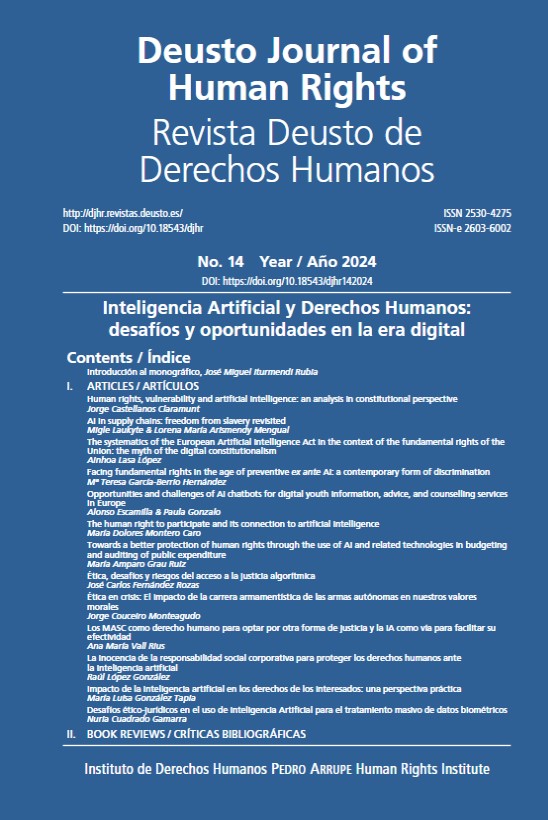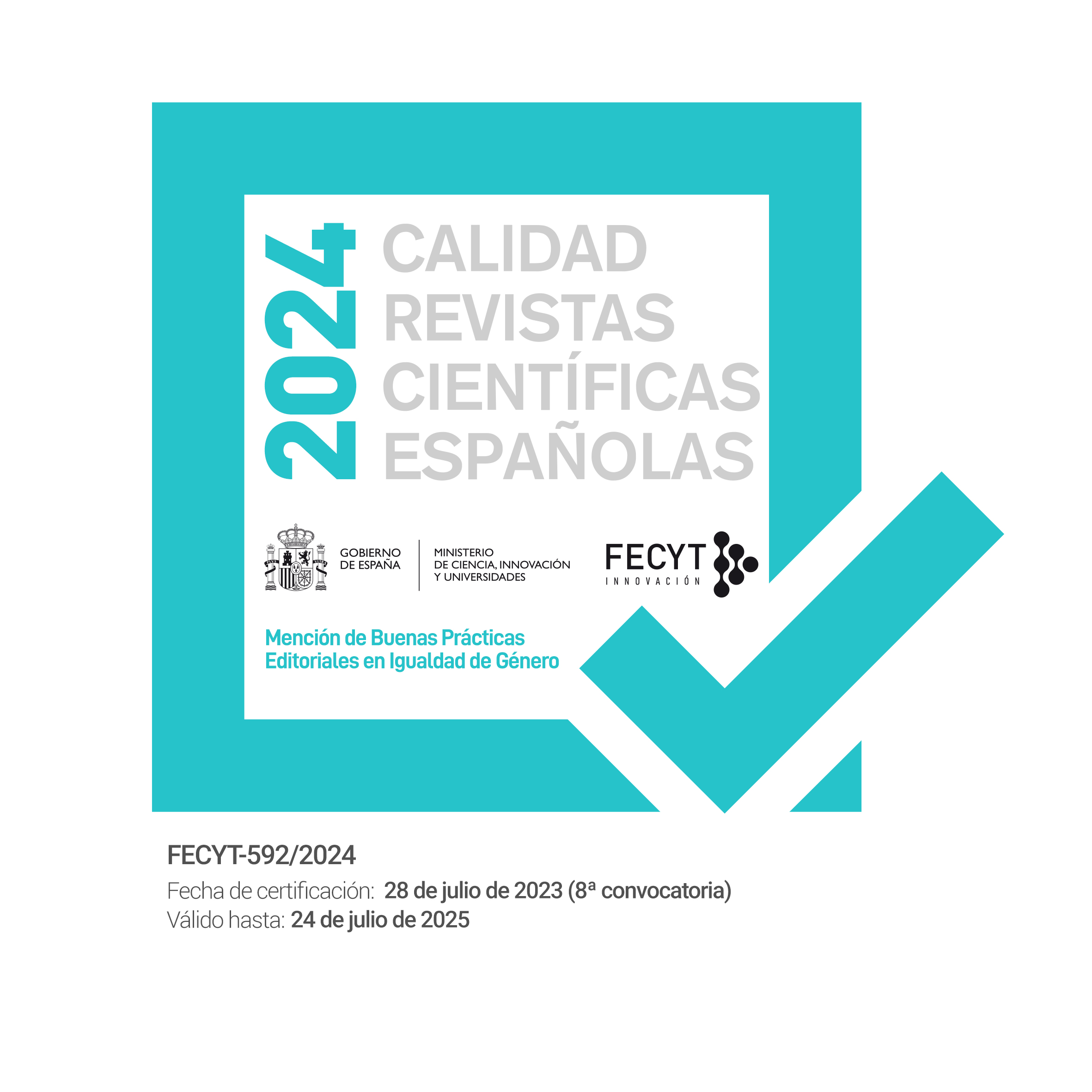Human rights, vulnerability and artificial intelligence: an analysis in constitutional perspective
Abstract
This article addresses the impact of artificial intelligence (AI) on human rights from a constitutional perspective, focusing on the vulnerability of certain groups in the face of technological advances. After an introduction contextualising the relevance of the topic, human rights in the technological context are examined, with a particular focus on the vulnerability of certain groups. An assessment is made of the areas of special protection for these people in relation to the use of AI, and discrimination arising from algorithmic biases is discussed. The conclusions highlight the need for legal research in the field of AI to focus on ensuring that technological progress does not undermine human rights acquired over time. The importance of protecting vulnerable groups, whose vital development may be disproportionately affected by the impact of AI, is emphasised. It identifies areas where the advancement of AI may generate adverse effects on citizens’ rights, underlining the importance of adapting this technological progress to the protection of human rights. It also highlights the risk of algorithmic biases in the processing of personal data, highlighting the need to protect the privacy and data of individuals as fundamental elements to ensure an AI that respects human rights. It concludes that only an AI that respects these rights can contribute to a more advanced and just society, based on democratic principles.
Received: 08 April 2024
Accepted: 16 September 2024
Downloads
References
Acemoglu, Daron, and Simon Johnson. 2023. Poder y progreso. Nuestra lucha milenaria por la tecnología y la prosperidad. Bilbao: Deusto.
Ammerman, Julia. 2022. «Las personas vulnerables ante el derecho a la protección de datos personales». In La privacidad en el metaverso, la inteligencia artificial y el big data: Protección de datos y derecho al honor, coordinated by Ángel Acedo Penco, 49-63. Madrid: Dykinson.
Bauman, Zygmunt. 2013. Vidas desperdiciadas: la modernidad y sus parias. Barcelona: Paidós.
Bauman, Zygmunt. 2017. Modernidad líquida. Madrid: Fondo de Cultura Económica.
Ballesteros, Jesús. 1999. «El individualismo como obstáculo a la universalidad de los derechos humanos», Persona y derecho: Revista de fundamentación de las Instituciones Jurídicas y de Derechos Humanos 41: 15-28.
Ballesteros, Jesús. 2003. «¿Derechos? ¿Humanos?», Persona y derecho: Revista de fundamentación de las Instituciones Jurídicas y de Derechos Humanos 48: 27-46.
Casilli, Antonio A. 2021. Esperando a los robots: Investigación sobre el trabajo del clic. Santiago de Chile: Punto de Vista.
Castellanos, Jorge. 2020. «El derecho humano a participar: estudio del artículo 21 de la Declaración Universal de Derechos Humanos», Universitas 30: 33-51.
Castellanos, Jorge. 2024. «Una reflexión acerca de la influencia de la inteligencia artificial en los derechos fundamentales». In Ciencia de datos y perspectivas de la inteligencia artificial, coordinated by Francisca Ramón, 271-300. Valencia: Tirant lo Blanch.
Fernández Ruiz-Gálvez, Encarnación. 1996. «Derechos humanos: ¿yuxtaposición o integración?», Anuario de Filosofía del Derecho 13: 679-702.
Fernández Ruiz-Gálvez, Encarnación. 1999. «Derechos humanos: del universalismo abstracto a la universalidad concreta», Persona y derecho: Revista de fundamentación de las Instituciones Jurídicas y de Derechos Humanos 41: 57-88.
Harari, Yuval Noah. 2016. Homo deus: breve historia del mañana. Barcelona: Debate.
MacIntyre, Alasdair. 2001. Animales racionales y dependientes: por qué los seres humanos necesitamos las virtudes. Barcelona: Paidós Ibérica.
Nussbaum, Martha C. 2006. Las fronteras de la justicia: consideraciones sobre la exclusión. Barcelona: Paidós.
Orwell, George, 2013. 1984, Barcelona: Debolsillo. Saiz Garitaonandia, Alberto. 2023. «Personas vulnerables, justicia e inteligencia artificial: motivos para permanecer alerta». In Personas vulnerables y tutela penal, directed by Norberto J. de la Mata and Ana I. Pérez Machío, 93-110. Cizur Menor: Aranzadi.
Sen, Amartya. 2000. Desarrollo y libertad. Barcelona: Planeta. Terrones, Antonio L. 2023. «Inteligencia artificial fiable y vulnerabilidad: una mirada ética sobre los sesgos algorítmicos». In Vulnerabilidad digital: desafíos y amenazas de la sociedad hiperconectada, coordinated by Rebeca Suárez, Miguel Á. Martín and Luis M. Fernández Martínez, 263- 274. Dykinson: Madrid.
Valle, Raquel. 2023. «Inteligencia artificial y derechos de las personas con discapacidad», Revista Española de Discapacidad 11 (1): 7-28.
Zuboff, Shoshana. 2020. La era del capitalismo de la vigilancia: la lucha por un futuro humano frente a las nuevas fronteras del poder. Barcelona: Paidós.
Deusto Journal of Human Rights / Revista Deusto de Derechos Humanos is an Open Access journal; which means that it is free for full and immediate access, reading, search, download, distribution, and reuse in any medium only for non-commercial purposes and in accordance with any applicable copyright legislation, without prior permission from the copyright holder (University of Deusto) or the author; provided the original work and publication source are properly cited (Issue number, year, pages and DOI if applicable) and any changes to the original are clearly indicated. Any other use of its content in any medium or format, now known or developed in the future, requires prior written permission of the copyright holder.



3.jpg)
3.jpg)
3.jpg)
.jpg)








